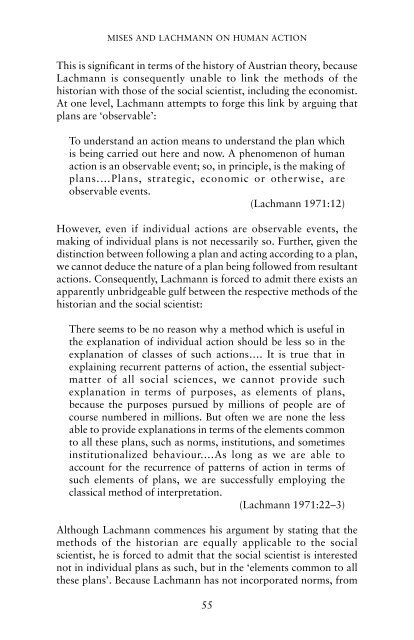Subjectivism and Economic Analysis: Essays in memory of Ludwig ...
Subjectivism and Economic Analysis: Essays in memory of Ludwig ...
Subjectivism and Economic Analysis: Essays in memory of Ludwig ...
You also want an ePaper? Increase the reach of your titles
YUMPU automatically turns print PDFs into web optimized ePapers that Google loves.
MISES AND LACHMANN ON HUMAN ACTIONThis is significant <strong>in</strong> terms <strong>of</strong> the history <strong>of</strong> Austrian theory, becauseLachmann is consequently unable to l<strong>in</strong>k the methods <strong>of</strong> thehistorian with those <strong>of</strong> the social scientist, <strong>in</strong>clud<strong>in</strong>g the economist.At one level, Lachmann attempts to forge this l<strong>in</strong>k by argu<strong>in</strong>g thatplans are ‘observable’:To underst<strong>and</strong> an action means to underst<strong>and</strong> the plan whichis be<strong>in</strong>g carried out here <strong>and</strong> now. A phenomenon <strong>of</strong> humanaction is an observable event; so, <strong>in</strong> pr<strong>in</strong>ciple, is the mak<strong>in</strong>g <strong>of</strong>plans.…Plans, strategic, economic or otherwise, areobservable events.(Lachmann 1971:12)However, even if <strong>in</strong>dividual actions are observable events, themak<strong>in</strong>g <strong>of</strong> <strong>in</strong>dividual plans is not necessarily so. Further, given thedist<strong>in</strong>ction between follow<strong>in</strong>g a plan <strong>and</strong> act<strong>in</strong>g accord<strong>in</strong>g to a plan,we cannot deduce the nature <strong>of</strong> a plan be<strong>in</strong>g followed from resultantactions. Consequently, Lachmann is forced to admit there exists anapparently unbridgeable gulf between the respective methods <strong>of</strong> thehistorian <strong>and</strong> the social scientist:There seems to be no reason why a method which is useful <strong>in</strong>the explanation <strong>of</strong> <strong>in</strong>dividual action should be less so <strong>in</strong> theexplanation <strong>of</strong> classes <strong>of</strong> such actions…. It is true that <strong>in</strong>expla<strong>in</strong><strong>in</strong>g recurrent patterns <strong>of</strong> action, the essential subjectmatter<strong>of</strong> all social sciences, we cannot provide suchexplanation <strong>in</strong> terms <strong>of</strong> purposes, as elements <strong>of</strong> plans,because the purposes pursued by millions <strong>of</strong> people are <strong>of</strong>course numbered <strong>in</strong> millions. But <strong>of</strong>ten we are none the lessable to provide explanations <strong>in</strong> terms <strong>of</strong> the elements commonto all these plans, such as norms, <strong>in</strong>stitutions, <strong>and</strong> sometimes<strong>in</strong>stitutionalized behaviour.…As long as we are able toaccount for the recurrence <strong>of</strong> patterns <strong>of</strong> action <strong>in</strong> terms <strong>of</strong>such elements <strong>of</strong> plans, we are successfully employ<strong>in</strong>g theclassical method <strong>of</strong> <strong>in</strong>terpretation.(Lachmann 1971:22–3)Although Lachmann commences his argument by stat<strong>in</strong>g that themethods <strong>of</strong> the historian are equally applicable to the socialscientist, he is forced to admit that the social scientist is <strong>in</strong>terestednot <strong>in</strong> <strong>in</strong>dividual plans as such, but <strong>in</strong> the ‘elements common to allthese plans’. Because Lachmann has not <strong>in</strong>corporated norms, from55

















